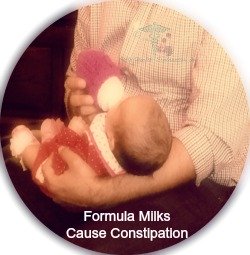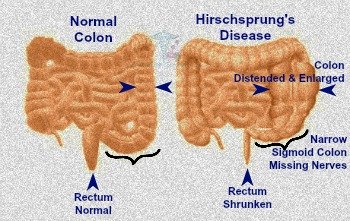Constipation in Infancy
by Shweta Gupta
(Mumbai,Maharashtra,India)

Cow Milk Allergy & Formula Milks Are Known To Cause Constipation.
Hello Doctor,
My 13 weeks old daughter is suffering from constipation for last 7 weeks.
First one and a half months she passed stools every second or third day. But from seventh week onwards and till date we have used glycerine suppository to help her pass the stools.
During the said period, she has passed stools on her own only 2-3 times.
I’m very concerned about it.
My question are:
1. Is this normal for a 3 months old infant?
2. Does frequent use of glycerine suppository have any side effects?
We use it when she is in too much discomfort or she has not passed stools for more than 7 days.
3. Does this have any co-relation with my food intake and water intake.
I will be waiting for your reply Doc.
Thank you in advance.
Surely, it is a cause for concern.
Constipation cannot be normal, especially when it is the cause of obvious discomfort in the baby.
Glycerine suppository
Glycerine suppository per se do not have any side effect, but its use gives only a temporary relief. Nevertheless, it does force out the big hard stools that hurt. The situation gets worse when the passage of hard stools results in intensely painful tiny tears on the inner lining of anal canal, the anal fissures.
Painful passage of stools and the associated injury set in the vicious cycle of reflex withholding of the stools, perpetuating and worsening of constipation and recurrent injury. Besides, if glycerine suppository placement is used as the mainstay of the therapy for constipation, it not only makes infants dependent on rectal stimulation, but also delays the search for the underlying cause.
Causes of constipation during early infancy in order of priority:
A. Hypothyroidism:
Basic test needed TSH, T3 and T4 levels in the blood.
In first two weeks of life the subtle signs of insufficient production of thyroid hormones are delayed passage of meconium (the black color stools of newborn) and prolonged neonatal jaundice. More apperant, but yet uncertain, signs like distension of abdomen (belly), lethargy and constipation appear only at 4-6 weeks of life.
Thyroid hormone is crucial for children’s optimal development and functional maturation of the organs. Delay in diagnosis and thereby in replacement therapy can cause serious delay in cognitive development of the baby. Therefore, newborns are universally screened for adequate thyroid function within 2 weeks of life.
B. Lead poisoning:
Though very unlikely in a 3 month old baby, it has gained the priority to minimize the pricks given to the baby and to avoid any further delay in diagnosis. It presents as anaemia, which is not clinically apparent in initial stages.
Basic blood parameters; haemoglobin, serum iron, red and white blood cell count and their morphology (shape and structure), packed cell volume and good peripheral smear examination reveals a lot. Specifically, serum lead levels can also be evaluated but not at the cost of good study of basic blood parameters.
C. High Vitamin D and calcium blood levels for an unknown cause:
Vitamin D and calcium (total and ionised) levels in the blood.
D. Electrolytes imbalance:
Serum electrolytes and arterial acid base analysis.
Precise proportion and distribution of electrolytes in the body are essential for normal body functions. There are many causes for imbalance in the body salts. As of now it is important to know whether your daughter has it or not. If any imbalance is found then your local paediatrician will surely take the necessary steps.
E. Baby’s diet and medications:
1. Watch for overdose of Iron, calcium and vitamin D supplementation.
2. Inadequate intake:
i.) Keep diet diary for 1 month
ii) Take weight once a week for next 4 weeks, and then monthly.
3. Inadequate water intake:
These are summer months, and in India summer is severe. At high temperatures the imperceptible loss of body water can be high enough to cause subclinical dehydration, which may present as constipation.
4. Milk:
Change from mother’s milk to top milk often causes constipation in infants. Formula milks are known for this. Moreover, constipation is also one of the signs of cow milk allergy.
5. Weaning foods:
Early introduction of cereals or other marketed instant baby foods.
6. Use of medications:
i.) Opioids:
Opioids give relief from pain and causes sleepiness. These attributes make it a common adjuvant in most of the locally popular medicines for infants like Balkadu, Balgutti, some brands of gripe water etc. Constipation is its common side effect.
ii) Common cold medications:
Over the counter available common cold medications contain antihistamine group of drugs which are known to cause constipation. These medications administered to the baby or taken by the breast feeding mother could cause constipation in her baby.
iii) Antispasmodic drugs and herbs:
These are commonly used to give relief from infantile colic, but they can cause constipation as a side effect. However, Simethicone containing anti colic drops are generally considered safe for infants. Nevertheless, please do not give any medication to your baby without consulting your local doctor.
F. Drugs taken by a breast feeding mother
Many drugs pass through the mother’s milk. Lactating mothers should consult their local doctor for the effects of the drug they are prescribed on their baby. If you do not get a satisfactory answer and wish to read it on your own click here and again discuss with your treating doctor before making any changes in the therapy.
The drugs that could cause constipation in breastfed babies are:
i.) Calcium channel blockers given for high blood pressure.
ii) Thiazide group of diuretics (Drugs that increase urination)
iii) Antidepressants
iv) Anticonvulsants
v.) Antacids, especially those containing Aluminium or Bismuth.
Second line of workup for constipation in infants:
(If none of the above answer your concern.)
I. Hirschsprung's disease, also known as congenital megacolon.
It is an inborn paucity of nerves in gastrointestinal tract, most commonly in the large intestine - see the illustration given above. The diagnosis of Hirschsprung’s disease gets delayed if the early signs like failure to pass the first stool within 48 hours of birth and prolonged neonatal jaundice go unnoticed.
Suction rectal biopsy is the gold standard for its diagnosis. The level of the affected intestines is ascertained by photographic recording of real-time moving X-ray images of the passage of contrast medium through anorectal region. If well done suction biopsy is inconclusive, full thickness biopsy is indicated after taking into consideration the results of Anorectal Manometry and Barium Enema.
II. Hypotonic syndromes: Diagnosed by a good neurological examination.
III. Partial obstruction:
Ultrasound abdomen, specifically to rule out any mass obstructing the passage of stools in colon or anorectal region. The possibility of such mass is very rare. Other causes of such partial obstructions are sigmoid strictures, anal or rectal malformation, fibrous bands and microcolon.
Third line of Investigations:
To be considered only if earlier workup does not clinch the diagnosis.
1. Cow’s milk allergy
2. Abnormal kidney functions:
Complete Urine Analysis including specific gravity, pH and electrolytes.
3. Urine test for Porphyuria: To read more click here
4. Sweat test to rule out Cystic Fibrosis.
5. Celiac panel tests to rule out celiac disease.
6. Anal trauma, usually as consequence of Child Abuse
Hope this helps!
Post questions or add information through comments - see below.
For questions on new topics click Free Forums:Ask Doc or Newborn Care.
Best Wishes.
Comments for Constipation in Infancy
|
||
|
||
Liked what you read just now? Pay it forward!












